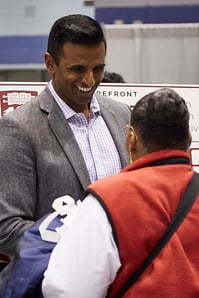UChicago ROCK brings free health education to the community

As an emergency department physician, John Purakal, MD, doesn’t get as much time as he’d like to thoroughly educate his patients, who often show up with issues related to obesity, high blood pressure, diabetes and other common, chronic diseases.
To address that need, Purakal recently launched UChicago ROCK (Raising Our Community’s Knowledge). It’s a free, health education initiative — lectures, demonstrations, plus questions and answers from the audience — covering common health concerns. The program is aimed at the South Side community surrounding University of Chicago Medicine.
As physicians we have a certain responsibility to be of service to the community. And educating patients is so important.
Purakal envisions the initiative bringing together medical students, physicians and other health care professionals to present topics both on-campus and off, at faith-based and community organizations as well as schools. They’re also targeting patients and families who show up at the Emergency Department, some of whom represent a particularly high-risk demographic with significant diseases who are oftentimes under-insured or without access to care.
Topics range from high cholesterol, high blood pressure, heart health and diabetes, to drug use, women’s health, sexually transmitted infections and depression.
 “We can talk to high school and middle school students about sexual health and obesity, and talk to nursing home residents about vaccinations or recognizing stroke and reducing their risk for that. It’s about empowering people of all ages with health knowledge,” explains Purakal, who is an assistant professor at University of Chicago Medicine.
“We can talk to high school and middle school students about sexual health and obesity, and talk to nursing home residents about vaccinations or recognizing stroke and reducing their risk for that. It’s about empowering people of all ages with health knowledge,” explains Purakal, who is an assistant professor at University of Chicago Medicine.
“We target groups of people at risk for different illness and diseases, and find passionate speakers to give basic lessons on those topics," Purakal said. "So people have an idea of what the disease is, if they or their loved ones are at risk, what they can do to prevent it, and if they have it, what steps can they take to make better health choices.”
Purakal started a similar education program in Detroit when he was a medical student, because of research he had done on high blood pressure.
“We asked people in the emergency department about their beliefs about high blood pressure and found that the majority of patients had misconceptions, even though they’d been on anti-hypertensive medications and had seen a doctor for years,” he says.
Patients didn’t believe it was a chronic disease, for example, or didn’t understand that there weren’t always symptoms, which resulted in poor compliance with their medications
The Detroit group eventually spoke to more than 4,000 people by the time Purakal left the area. In Chicago, Purakal is aiming to make UChicago ROCK bigger and better. Besides going into the community, patients being discharged from the emergency department will be told about upcoming talks, so they can learn about follow-up care — which is especially important for those who don’t have a primary care physician.
“As physicians we have a certain responsibility to be of service to the community,” says Purakal. “And educating patients is so important. Everyone has gaps in their knowledge but patients with poor health literacy, significant disease or lack of access are at much higher risk and they need interventions like this to get them to a level playing field.”
For information on upcoming talks or to connect with UChicago ROCK, visit them on social media:
- Facebook: Facebook.com/UChicagoROCK
- Twitter: Twitter.com/UChicagoROCK
- Email: uchicagorock@gmail.com
